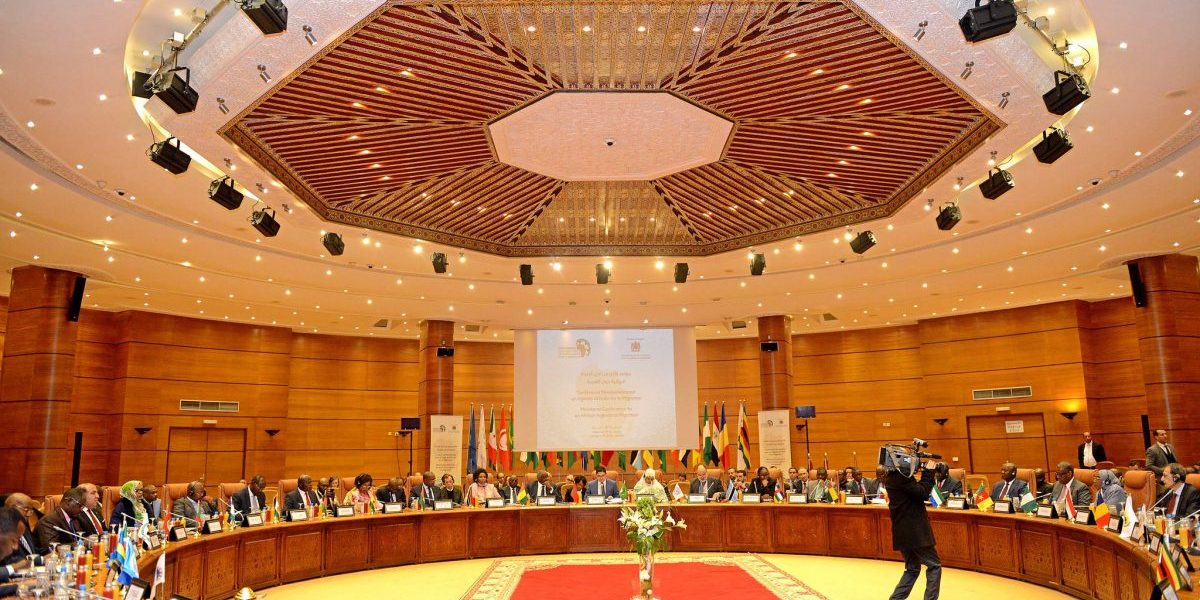At its establishment, the OAU was also the stuff of big dreams, but its legacy was a mixed one, which had made many painful mistakes. When it was replaced by the African Union (AU), many were hopeful that a new day had dawned. The OAU was part of the “old” Africa, the AU the harbringer of the “new”. But “old” and “new” Africa are struggling to define what Africa Day should mean.
“Old” Africa looks backward. It is well represented by Zimbabwe, a state headed by the same autocrat, Robert Mugabe, for 29 years. Mugabe’s rule has been marked by an uncompromising hold on political power, the collapse of the rule of law, severe human rights abuses, looting of the economy and intimidation of political opposition. Last year saw an escalation of Zimbabwe’s troubles, when in a manner reminiscent of a failed state the government of Zimbabwe failed to contain an outbreak of cholera, which resulted in over 4,000 deaths. Apart from that the country also witnessed a highly controversial election, during which the opposition was ferociously attacked and some of the results probably rigged. Currently, the economy of Zimbabwe is so run down that the Rand – currency of neighbouring South Africa – has had to be adopted to stop hyperinflation.
“New” Africa looks forward. It is typified by Ghana. By no means perfect, it has nonetheless pulled itself out of near collapse in the early 1990s, and has enjoyed robust economic growth and a prudent policy environment. Like Zimbabwe it held an election last year, which was not free of controversy. But unlike Zimbabwe, the incumbent President John Kufour did not seek re-election, his party’s candidate ultimately accepted defeat, and power was transferred democratically.
These patterns appear elsewhere. Most often the tussle between “new” and “old” is less stark and dramatic, and takes place within societies. They may involve efforts by activists to abolish female genital mutilation in Benin; protests over the use of live ammunition by law enforcement agencies to disperse demonstrations in Uganda; civil society mobilisation to oppose a third term for the president of Zambia, and subsequent agitation for a new constitution; labour, church and legal resistance to prevent an arms shipment destined for Zimbabwe’s government from offloading its cargo in southern Africa; and in the work across the continent of journalists and media activist to expand their activity, often under very inhospitable conditions. As the new Africa pushes for democratisation, for development and for it civil and human rights, the old often resists, sometimes with force and sometimes with deception: elections in countries like Equatorial Guinea are widely regarded as fraudulent. Dysfunction and repression can benefit some and reform can be profoundly destabilising.
Curiously the governments of Ghana and Zimbabwe do not receive vastly different treatment from African leaders and continental organisations. This recalls the OAU. Its goals were to decolonise the continent, and provide the patchwork of states with a strong, coherent, international voice. It also aimed pursue development and human rights (a continental commission for this is based in Togo, and the OAU produced an extensive library of human rights standards). The OAU did play a role in decolonisation and opposing the white minority governments in Southern Africa, but its contribution in other spheres was highly questionable. Accepting member states primarily on the basis that they were “African”, it never developed a proper value system. Thus, democracies like Botswana and Mauritius found themselves alongside such highly repressive regimes as Macias Nguema’s Equatorial Guinea.
Indeed, the OAU made it a principle to defend its members’ sovereignty in internal affairs, with scant regard for what they were doing. Festo Kivengere, a Ugandan bishop, has this to say: “The OAU’s silence has encouraged and indirectly contributed to the bloodshed in Africa. I mean, the OAU even went as far as to go to Kampala [for its 1975 summit] and make [the Ugandan dictator Idi] Amin its chairman. And at the very moment the heads of state were meeting in the conference hall, talking about the lack of human rights in southern Africa, three blocks away, in Amin’s torture chambers, my countrymen’s heads were being smashed with sledgehammers and their legs were being chopped off with axes”.
The transformation of the OAU to the AU was meant to change that. Its founding charter recognised the need for democratic governance and explicitly permitted intervention in states’ internal affairs on particular grounds. In practice, however, the change remains incomplete. The AU has suspended countries that underwent coups – the most recent example being Madagascar. It has spawned “good governance” initiatives such as the New Partnership for Africa’s Development (Nepad) and the African Peer Review Mechanism (APRM). African countries were instrumental in formulating the doctrine of the “responsibility to protect”. The long-term effects of these initiatives remain to be seen.
But its response to repression in Zimbabwe has been tepid (although it has at least recognised that there are severe problems) and it has yet to make significant demands of autocrats who were present at the creation of the AU. One of the most obdurate, “brother-leader” Muammar Gadaffi of Libya, who has been in power since 1969 and has never faced an election, has openly derided democracy as inappropriate for Africa. He is currently the chair of the AU.
The AU largely fails to distinguish between the “old” and “new” Africas, and continues to lack a real set of values. The outspoken Ghanaian economist, George Ayittey, advised the US president Barack Obama to ignore the AU: “it can’t even define democracy”. Can he be proven wrong? As its charter and initiatives purportedly support democracy and “good governance”, wouldn’t it make sense to praise the conduct of the “new” African states and to censure “old”? To actively hold the AU’s members to the letter and spirit of its charters and conventions? An organisation is only as strong as the collective will of its members.
What inspires on Africa Day is that the “new” Africa is fighting its corner. It has not won the battle – at least not for power – and it faces formidable opponents. Genuinely democratic societies are few on the continent, and “new” Africa cannot be sanguine about the future. But it has won important victories in the realm of ideas: democracy is a watchword, albeit a contested and oft-manipulated one. The leadership of the African Union, and those who believe in its stated mission need to take this opportunity to reflect on the stand that this body should take. As Africa celebrates Africa Day, the organisation needs to decide with which Africa it is celebrating. It cannot sit by and split the difference. The meanings are fundamentally contradictory: for the “new”, the day is about a new dawn, for the “old” it is about a perpetual dusk.







